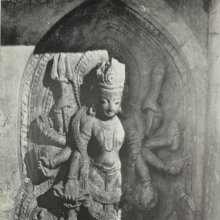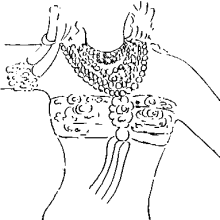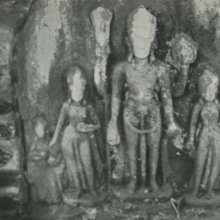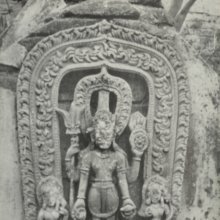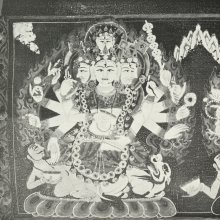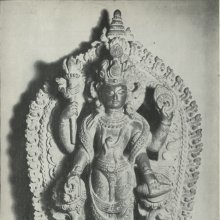Hara, Hāra: 45 definitions
Introduction:
Hara means something in Buddhism, Pali, Hinduism, Sanskrit, Jainism, Prakrit, the history of ancient India, Marathi, Hindi, biology. If you want to know the exact meaning, history, etymology or English translation of this term then check out the descriptions on this page. Add your comment or reference to a book if you want to contribute to this summary article.
Hara has 45 English definitions available.
Images (photo gallery)
(+9 more images available)
Languages of India and abroad
Sanskrit dictionary
[Deutsch Wörterbuch]
Source: Cologne Digital Sanskrit Dictionaries: Böhtlingk and Roth Grosses Petersburger WörterbuchHara (हर):—(von 1. har)
1) adj. (f. ā, seltener ī) am Ende eines comp. [Pāṇini’s acht Bücher 3, 2, 9. 10.] a) tragend; s. kavaca . — b) treibend, führend: ūrdhvabhāga aufwärts [Suśruta 1, 144, 14.] adhobhāga [19.] apathaharā indriyāśvāḥ auf Abwege [Kirātārjunīya 5, 50.] — c) hinbringend, befördernd: duṣpravṛtti eine schlechte Nachricht zu (prati) [Raghuvaṃśa 12, 51.] — d) entführend, raubend, Entwender: haya [Rāmāyaṇa Gorresio 1, 42, 25.] dārarājya [Rāmāyaṇa 4, 17, 38.] [Varāhamihira’s Bṛhajjātaka S. 15, 26.] [Spr. (II) 2584.] [Kathāsaritsāgara 32, 72.] [Bhāgavatapurāṇa 3, 18, 11. 9, 8, 9.] uneig.: anaṅgāṅga [Mahābhārata 14, 211.] prajñā, śakti [Spr. (II) 6773.] jīvita [Kathāsaritsāgara.39, 80.] pratāpāyuḥśrī [Rājataraṅgiṇī 6, 257.] entziehend so v. a. übertreffend: vakṣojāvibhakumbhavibhramaharau [Spr. (II) 5896.] — e) entfernend, verscheuchend, vertreibend (ein Uebel), zu Nichte machend: agha [Kathāsaritsāgara 32, 51.] ārti [42, 82.] [Rājataraṅgiṇī 3, 87.] [Bhāgavatapurāṇa 1, 8, 43. 3, 4, 4. 8, 27. 4, 10, 30.] jarāmṛtyu [8, 9, 21.] [PAÑCAR. 1, 4, 15.] madadarpa [Spr. (II) 2454.] ratikheda [Sāhityadarpana 19, 18.] śoka [Mahābhārata 13, 902.] śrama [Kathāsaritsāgara 84, 2.] saṅgadoṣa [Bhāgavatapurāṇa 3, 25, 24.] sarvapāpa [Yājñavalkya’s Gesetzbuch 3, 309.] [Mahābhārata 3, 13414.] yajña [Mahābhārata 12, 10465.] [Rāmāyaṇa 1, 40, 26.] ari [Mahābhārata 1, 2659.] pṛthu (so ed. Bomb.) [14, 210.] trupara [Harivaṃśa 10565.] [Spr. (II) 1525.] sarvabhūta [Suśruta 1, 181, 20.] [PAÑCAR. 4, 3, 59.] = naśaka [Hemacandra’s Anekārthasaṃgraha 2, 470.] — f) für sich nehmend, erhaltend: brahmadāya [Manu’s Gesetzbuch 3, 3.] śarīrārdhaharā harasya [Kumārasaṃbhava 1, 51.] — g) hinreissend, entzückend: manodṛṣṭi [Rāmāyaṇa 2, 96, 4.] —
2) m. a) Divisor [Algebra 8. 13. 85.] [Journ. of the Am. Or. S. 6, 558.] Comm. zu [ĀRYABH. 2, 27.] — b) Hengst (!) [ŚAUNAKA] in [Gebiete des Deutschen 1, 442.] Esel [ŚABDĀRTHAK.] bei [WILSON.] — c) Feuer ebend. und [Hemacandra’s Anekārthasaṃgraha] — d) der Zerstörer als ein N. Śiva’s [Amarakoṣa.1,1,1,29.3,4,7,32. 19,132. 27,208.] [Hemacandra’s Abhidhānacintāmaṇi 198.] [Hemacandra’s Anekārthasaṃgraha] [Halāyudha.1,11.] [ĀŚV. GṚHY.4,8,19.] [ŚVETĀŚV. Upakośā.1,10.] [Manu’s Gesetzbuch 12,121.] [Mahābhārata.1,4371. 7970.] [Harivaṃśa 7198. 7455. 10565. 10632. fg. 10657.] [Rāmāyaṇa.1,44,9. 45,27.] [Meghadūta 7. 45.] [Raghuvaṃśa.4,32.] [Kumārasaṃbhava.1,51.7,44.] [?ad Śākuntala 32,5. Vikramorvaśī 48. Mālavikāgnimitra 46. Spr. (II) 203. 986. 2303. 6859. 7173. 7369. Sāhityadarpana 54,2. Varāhamihira’s Bṛhajjātaka S. 43,52. Kathāsaritsāgara.1,45. 18,213. 27,142. Prabodhacandrodaja 54,12. Rājataraṅgiṇī.1,1. 72. 90.2,71. 134.3,1. 451. 482.4,38. Bhāgavatapurāṇa.1,2,23.2,6,31.7,39.7,10,66. Oxforder Handschriften 27,a,4. 38. 46,a,3. 80,a,23. 276,b,14. SARVADARŚANAS. 98,13. Pañcatantra 63,7. Vopadeva’s Grammatik.5,7. HALL 126.] unter den 11 Rudra [Jaṭādhara] in [Oxforder Handschriften 82,a,25. 190,a,38.] [Mahābhārata 12,7585.] [Harivaṃśa 166.] [Oxforder Handschriften 82,b,25.] — e) Nomen proprium a) eines Dānava [Mahābhārata 1, 2659.] [Harivaṃśa 203. 2283. 12939. 14284.] — β) eines Affen [Rāmāyaṇa 6, 13, 8. 7, 5, 43.] — γ) eines Autors [Verz. d. Tüb. H. 13.] eines Lexicographen [Medinīkoṣa Anhang 1.] eines Sohnes des Kubera [HALL] in der Einl zu [VĀSAVAD. 12.] — hara [Rājataraṅgiṇī 1, 90] fehlerhaft für hāra; vgl. [Bhāgavatapurāṇa 10, 35, 4.] — Vgl. aṃśa, aśmarī, kavaca, kṣata, kha, go, granthi, tamo, tāpa, dhana, dhī, paśyato, pāpa (auch [Bhāgavatapurāṇa 4, 1, 46]), pitta, pūṣadanta, pṛthvī, prāgra, prāṇa (auch [Mahābhārata 7, 2122]), bīja, bhaganetra, bhāga, bhāra, bhūta, bhrānti, madana, mano, mūla, yaśo, rajo, rāhumūrdha, riktha, roga, vāta, vārttā, viṣa (als adj. auch [Suśruta 1, 180, 13.] harī vidyā [Mahābhārata 1, 1204]), śakti, śāsana, śīla, śūnya, śrī, sattva, saṃdeśa, sarva (vom Tode [Bhagavadgītā 10, 34]), sarvaṃ, su, sudhā, smara, smṛti .
--- OR ---
Hāra (हार):—(von 1. har)
1) adj. am Ende eines comp. (f. ī) tragend, herbeischaffend; forttragend; entwendend: kṣīra [Mārkāṇḍeyapurāṇa 51, 35.] für sich nehmend, erhebend: kara Abgaben [Spr. (II) 6580.] selbständig so v. a. hinreissend, entzückend [Bhāgavatapurāṇa 10, 7, 2.] oder auch nach dem Comm. auf Hari bezüglich, H. betreffend. —
2) m. a) Divisor [Algebra 10.] [Journ. of the Am. Or. S. 6, 558.] — b) eine prosodisch lange Silbe [Colebrooke 2, 151.] — c) Perlenschnur, schmuck (am Ende eines adj. comp. f. ā) [Amarakoṣa 2, 6, 3, 4. 6. 3, 4, 6, 31. 14, 82.] [Hemacandra’s Abhidhānacintāmaṇi 658. 661.] [Anekārthasaṃgraha 2,472.] [Medinīkoṣa r. 101.] [Halāyudha 2, 409. 5, 5.] [Mahābhārata 1, 7021. 7023. 2, 2056. 3, 1824.] hārālaṃkārayogyau te stanau [4, 392. 5, 4223. 6, 3967. 8, 4913. 13, 765.] [Harivaṃśa 3970. 4371.] [Rāmāyaṇa 2, 32, 7. 3, 58, 36. 4, 44, 90. 5, 13, 34. 6, 112, 91.] [Meghadūta 68.] [Ṛtusaṃhāra 1, 4. 6. 2, 18. 3, 20.] [Raghuvaṃśa 5, 52. 6, 16.] [Kumārasaṃbhava 5, 8.] [Gītagovinda 7, 14.] [Spr. (II) 844. 1316. 1787. 1910. 2147. 3885. 6173. 7247. 7385. fg.] [Varāhamihira’s Bṛhajjātaka S. 4, 31. 11, 10. 43, 32.] [Chandomañjarī 112.] [Kathāsaritsāgara 18, 17. 26, 232. 28, 124. 136. fg. 33, 211.] [Prabodhacandrodaja 81, 16. 95, 1.] [Sāhityadarpana 42, 21.] [Rājataraṅgiṇī 3, 414. 4, 69. 5, 13. 256. 358. 379.] [Mārkāṇḍeyapurāṇa 23, 102.] [Bhāgavatapurāṇa 1, 16, 16. 3, 8, 28. 15, 41. 23, 19. 32. 28, 15. 25. 4, 9, 38. 10, 19. 15, 16. 24, 48.] [PAÑCAR. 1, 7, 49. 11, 34.] [Pañcatantra 52, 22.] mauktika [Caurapañcāśikā 16.] ratna [Oxforder Handschriften 258,b,2.] nāga [PAÑCAR. 1, 11, 21.] — d) ein Perlenschmuck von 108 Schnüren [Varāhamihira’s Bṛhajjātaka S. 81, 32.] [Hemacandra’s Abhidhānacintāmaṇi 659.] aus 64 Schnüren [661, Scholiast] Zahl unbestimmt [Halāyudha 2, 407.] — e) nom. act. α) Raub: sarvasva [Manu’s Gesetzbuch 9, 242.] parasva [Mahābhārata 3, 17447.] rājya [Kathāsaritsāgara 30, 87.] — β) Weg nahme, Entfernung: bhārahārāya bhūmeḥ [Bhāgavatapurāṇa 10, 63, 27.] — γ) Kampf [Hemacandra’s Anekārthasaṃgraha] [Medinīkoṣa] —
3) f. ā nom. act. [Pāṇini’s acht Bücher 3, 3, 104.] [Vopadeva’s Grammatik 26, 191.] —
4) f. ī a) Perle [Śabdaratnāvalī im Śabdakalpadruma] — b) ein best. Metrum: 4 Mal ¯ ¯ ˘ ¯ ¯ [Colebrooke 2, 158 (V, 2).] — Vgl. agra, agha, aṅga ( [Kumārasaṃbhava 7, 91]). ardha, uda, udaka, kāla (Zeitgewinn [Kathāsaritsāgara 31, 75. 77. 32, 10]), kuru, jala, dṛti, nagara, prāg, preta, phala, bali, bhāga, bhāra, manohārī, muktā (auch [Pañcatantra 53, 1]), mṛta, rāja, riktha, lekha, saṃdeśa, samiddhāra, sarva, sarvasattvaujohārī, svayaṃhārakarī und svayaṃhārī.
Sanskrit, also spelled संस्कृतम् (saṃskṛtam), is an ancient language of India commonly seen as the grandmother of the Indo-European language family (even English!). Closely allied with Prakrit and Pali, Sanskrit is more exhaustive in both grammar and terms and has the most extensive collection of literature in the world, greatly surpassing its sister-languages Greek and Latin.
See also (Relevant definitions)
Starts with (+506): Hairanagollu, Hara dhania, Hara dhanya, Hara Hara Mahadeva, Hara mekke kaayi, Hara muni, Hara nikhada, Hara-chirayata, Hara-ghunuca, Hara-gulab, Hara-mekki-kaui, Hara-mekki-kayi, Hara-nayana, Haraa, Haraai, Harababi, Harabahana, Harabakhata, Harabala, Harabange.
Ends with (+4384): Aandhi jhara, Abahvakshara, Abakhara, Abbhavahara, Abbhuddhara, Abhadra-vyavahara, Abhara, Abhaya Vihara, Abhayadhara, Abhayagirivihara, Abhibhara, Abhichara, Abhidhara, Abhighara, Abhihara, Abhinihara, Abhinirhara, Abhiparihara, Abhisamhara, Abhisankhara.
Full-text (+1272): Bharahara, Angahara, Haram, Harahara, Haras, Hura, Pragrahara, Harayashti, Ahara, Granthihara, Smarahara, Kshatahara, Harashaya, Haravati, Bhagahara, Uruhara, Suvidalla, Samdeshahara, Pretahara, Hari.
Relevant text
Search found 151 books and stories containing Hara, Hāra, Harā, Hārā, Haara; (plurals include: Haras, Hāras, Harās, Hārās, Haaras). You can also click to the full overview containing English textual excerpts. Below are direct links for the most relevant articles:
Garga Samhita (English) (by Danavir Goswami)
Verses 2.18.20-21 < [Chapter 18 - The Sight of Śrī Kṛṣṇacandra]
Verse 1.6.46 < [Chapter 6 - Description of Kaṃsa’s Strength]
Verse 2.20.7 < [Chapter 20 - The Rāsa-dance Pastime]
Bhakti-rasamrta-sindhu (by Śrīla Rūpa Gosvāmī)
Verse 2.4.33 < [Part 4 - Transient Ecstatic Disturbances (vyābhicāri-bhāva)]
Verse 2.1.360 < [Part 1 - Ecstatic Excitants (vibhāva)]
Verse 2.4.243 < [Part 4 - Transient Ecstatic Disturbances (vyābhicāri-bhāva)]
Sahitya-kaumudi by Baladeva Vidyabhushana (by Gaurapada Dāsa)
Text 9.43 [necklace diagram] < [Chapter 9 - Ornaments of Sound]
Text 9.9 < [Chapter 9 - Ornaments of Sound]
Text 9.32 < [Chapter 9 - Ornaments of Sound]
Kashyapa Shilpa-shastra (study) (by K. Vidyuta)
5. Measurement for the Storeys of the Gopuras < [Chapter 5 - Gopura Lakṣaṇa]
1. Conclusion (Prākāras) < [Chapter 6 - Conclusion]
4 (b). Technical terms for the component parts of the temple < [Chapter 2 - Author and his Works]
Chandogya Upanishad (Madhva commentary) (by Srisa Chandra Vasu)
Related products
(+2 more products available)
